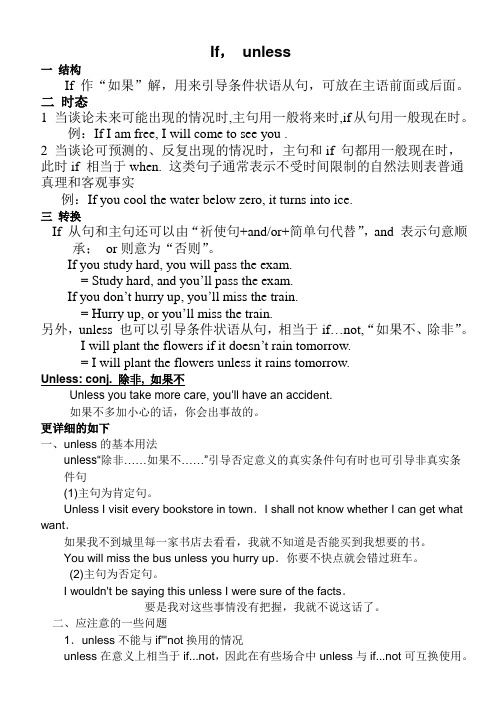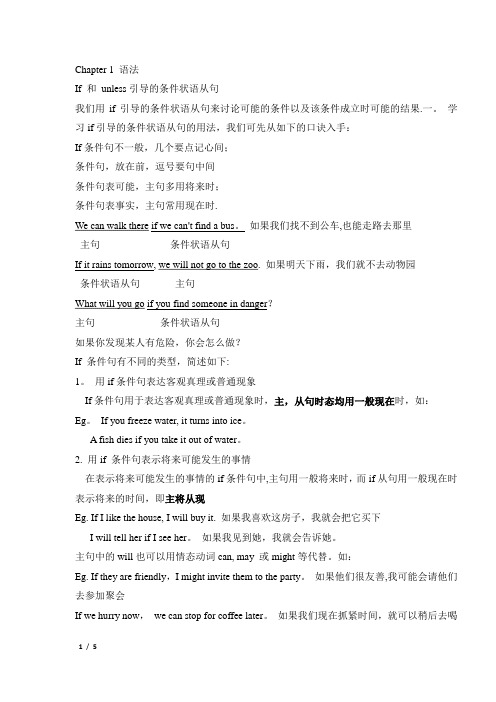if和unless区别和练习
if ,unless

If,unless一结构If 作“如果”解,用来引导条件状语从句,可放在主语前面或后面。
二时态1 当谈论未来可能出现的情况时,主句用一般将来时,if从句用一般现在时。
例:If I am free, I will come to see you .2 当谈论可预测的、反复出现的情况时,主句和if 句都用一般现在时,此时if 相当于when. 这类句子通常表示不受时间限制的自然法则表普通真理和客观事实例:If you cool the water below zero, it turns into ice.三转换If 从句和主句还可以由“祈使句+and/or+简单句代替”,and 表示句意顺承;or则意为“否则”。
If you study hard, you will pass the exam.= Study hard, and you’ll pass the exam.If you don’t hurry up, you’ll miss the train.= Hurry up, or you’ll miss the train.另外,unless 也可以引导条件状语从句,相当于if…not,“如果不、除非”。
I will plant the flowers if it doesn’t rain tomorrow.= I will plant the flowers unless it rains tomorrow.Unless: conj. 除非, 如果不Unless you take more care, you’ll have an accid ent.如果不多加小心的话,你会出事故的。
更详细的如下一、unless的基本用法unless“除非……如果不……”引导否定意义的真实条件句有时也可引导非真实条件句(1)主句为肯定句。
Unless I visit every bookstore in town.I shall not know whether I can get what want.如果我不到城里每一家书店去看看,我就不知道是否能买到我想要的书。
if引导的条件状语从句讲解和练习(答案)

t 条件状语从句一、 条件状语从句通常由 if (如果), unless (除非),as long as (只要)引导。
例如:If it rains tomorrow, we won ’go to the park. 如果明天下雨,我们就不去公园了。
Unless weather stops me, I go for a walk every. 我每天都会去散步,除非遇上坏天气。
Our parents will be pleased with our performance as long as we try our best.小试牛刀:1、只要我们竭尽全力,父母就会满意我们的表现。
Our parents will be pleased with our performance _____ _____ ______ we try our best.2、如果人人为保护环境做出贡献,世界将会变得更美好。
______ ______ ______ _____ _______ to protectingthe environment, the world will become much more beautiful.二、if 引导的条件状语从句(1)“if 从句+祈使句”的句子。
其实,if 作为一个连词,主句也可以是其他形式的句子。
例如:If you want to go, please let me know.If the green light isn ’t on, wait for a minute.(2)“祈使句 + and (or)+ 陈述句” 在意思上相当于一个带有条件状语从句的复合句。
注意:A. “祈使句 + and + 陈述句”可以转化为 if 引导的肯定条件状语从句,而且主语是第二人称。
B. “祈使句 + or + 陈述句”可以转化为 if 引导的否定条件状语从句,而且主语是第二人称。
unless if until although because but辨析

unless if until although becausebut辨析“unless”、“if”、“until”、“although”、“because”和“but”均为英语中的连词,用于连接句子或句子的各个部分,使语言表达更清晰、流畅。
它们之间的区别如下:- “unless”:引导条件状语从句,表示“除非”的意思。
例如:“You will fail the exam unless you study hard.”(除非你努力学习,否则你会考试不及格。
)- “if”:引导条件状语从句,表示“如果”的意思。
例如:“If it rains tomorrow, we will stay at home.”(如果明天下雨,我们将呆在家里。
)- “until”:引导时间状语从句,表示“直到”的意思。
例如:“I didn't go to bed until my mother came back.”(直到我妈妈回来,我才去睡觉。
)- “although”:引导让步状语从句,表示“尽管”的意思。
例如:“Although she studied hard, she still failed the exam.”(尽管她努力学习,但仍然考试不及格。
)- “because”:引导原因状语从句,表示“因为”的意思。
例如:“I didn't go to the party because I was tired.”(因为我累了,所以我没有去参加聚会。
)- “but”:引导转折关系,表示“但是”的意思。
例如:“She is young, but she is very smart.”(她虽然年轻,但非常聪明。
)。
when unless和if的用法 -回复

when unless和if的用法-回复Unless 和if 是两个常用的条件状语从句引导词,用于表示某个条件成立或者不成立时会发生的情况。
它们在语法结构和使用方式上有一些不同之处。
接下来,我将逐步解释这两个引导词的用法。
首先,我们来看一下"unless" 的用法。
"Unless" 引导的条件状语从句表示在某种情况下不成立的条件。
它的意思可以等同于"if not"。
比如:1. Unless it rains, we will have a picnic tomorrow.(除非下雨,否则我们明天要去野餐。
)2. You can go to the party tonight unless you have a test tomorrow. (除非你明天要考试,否则今晚你可以去参加派对。
)"Unless" 引导的条件状语从句可以出现在主句的前面或者后面,没有语序限制。
接下来,我们来看一下"if" 的用法。
"If" 引导的条件状语从句表示某种条件成立时会发生的情况。
它可以表示实际的条件,也可以表示虚拟的条件。
比如:1. If it rains, we will stay at home.(如果下雨,我们会待在家里。
)2. If I were you, I would study harder.(如果我是你,我会更加努力学习。
)需要注意的是,在虚拟条件句中,谓语动词要使用过去式,例如上面例句中的"were"。
此外,"if" 还可以引导一个条件状语从句,与主句用逗号分隔开来。
这种用法常见于表示建议、嘱咐或者提醒的句子中。
比如:1. If you have any questions, please feel free to ask.(如果你有任何问题,请随时提问。
if和unless区别和练习

Chapter 1 语法If 和unless引导的条件状语从句我们用if引导的条件状语从句来讨论可能的条件以及该条件成立时可能的结果.一。
学习if引导的条件状语从句的用法,我们可先从如下的口诀入手:If条件句不一般,几个要点记心间;条件句,放在前,逗号要句中间条件句表可能,主句多用将来时;条件句表事实,主句常用现在时.We can walk there if we can't find a bus。
如果我们找不到公车,也能走路去那里主句条件状语从句If it rains tomorrow, we will not go to the zoo. 如果明天下雨,我们就不去动物园条件状语从句主句What will you go if you find someone in danger?主句条件状语从句如果你发现某人有危险,你会怎么做?If 条件句有不同的类型,简述如下:1。
用if条件句表达客观真理或普通现象If条件句用于表达客观真理或普通现象时,主,从句时态均用一般现在时,如:Eg。
If you freeze water, it turns into ice。
A fish dies if you take it out of water。
2. 用if 条件句表示将来可能发生的事情在表示将来可能发生的事情的if条件句中,主句用一般将来时,而if从句用一般现在时表示将来的时间,即主将从现Eg. If I like the house, I will buy it. 如果我喜欢这房子,我就会把它买下I will tell her if I see her。
如果我见到她,我就会告诉她。
主句中的will也可以用情态动词can, may 或might等代替。
如:Eg. If they are friendly,I might invite them to the party。
如果他们很友善,我可能会请他们去参加聚会If we hurry now,we can stop for coffee later。
unless的用法归纳总结

unless的用法归纳总结一、什么是unless的用法?当我们学习英语条件句时,经常会使用到if和unless这两个词,在表示条件的同时也带有否定的意味。
本文将重点讨论"unless"这个词的用法,探讨其在句子中的位置以及它与其他条件状语从句相比有何不同之处。
二、unless与if的对比1. 位置区别:在条件状语从句中,"unless"通常位于主句前面或者在主句之后,并需要使用逗号进行分隔。
示例:Unless it rains, we will go for a picnic.(除非下雨,我们将去野餐)2. 否定含义:"Unless"与"if"表示相反的含义。
当使用“if”引导从句时,假设如果从句成立,则强调主干部分成立;而当使用“unless”引导从句时,假设如果从句不成立,则强调主干部分成立。
示例:If it rains, we will stay at home. (如果下雨,我们将待在家里)Unless it rains, we will go for a picnic. (除非下雨,我们将去野餐)3. 使用频率:在正式场合或书面英语中,“unless”相对较少使用。
通常情况下,在口语和非正式场合中多使用“if”而不使用“unless”。
三、unless用法的特点除了上述与"if"条件状语从句对比之外,"unless"还有其他一些独特的用法和规则:1. 用作介词:"Unless"在某些情况下可以被用作介词。
此时,它的含义变为除非或者没有其他去处。
示例:We will stay here unless we find a better place to go. (我们将留在这儿,除非我们找到一个更好的地方)2. 可否定祈使句:在表达否定性命令或建议时,也可以使用“unless”来取代“if not”。
when unless和if的用法
when unless和if的用法
在编程和逻辑表达式中,“when”、“unless”和“if”是三个常见的关键字或条件语句,它们分别有不同的用法和含义。
1. “when”的用法:
* “when”通常用于定义一个条件,当这个条件满足时,执行相应的代码块。
它的语法结构类似于“if”,但“when”更适用于多个条件的情况。
* “when”可以与“else”搭配使用,当所有条件都不满足时,执行“else”中的代码块。
* “when”也可以与“otherwise”搭配使用,当所有条件都不满足时,执行“otherwise”中的代码块。
2. “unless”的用法:
* “unless”表示“除非”的意思,它的语法结构与“if”相似,但含义相反。
* 当“unless”后面的条件满足时,不会执行其后的代码块。
相反,如果条件不满足,则执行相应的代码块。
* “unless”通常用于确保某个条件不满足时执行特定的操作。
3. “if”的用法:
* “if”用于定义一个条件,当这个条件满足时,执行相应的代码块。
如果条件不满足,可以选择执行“else”或“else if”中的代码块。
* “if”语句可以根据一个或多个条件进行判断,并根据条件的真假来执行相应的代码块。
这些关键字或条件语句在编程中非常常见,用于控制程序的流程和逻辑。
它们可以根据不同的条件来执行不同的操作,从而实现更加灵活和复杂的程序逻辑。
初中英语条件状语从句语法点和习题(含答案)
语法点拨:if与unless引导的条件状语从句1.常用引导词:if(如果),unless(除非)。
Iwon’tgotothemoviesunlessIamfreetomorrow.除非我明天有空,否则我不会去看电影。
2.条件状语从句的位置可放在句首或句尾,放在句首时常用逗号与主句隔开。
e.g.Ifitrainstomorrow,Iwillstayathome.=Iwillstayathomeifitrainstomorrow.如果明天下雨我就呆在家里。
3.if引导词用法if引导的条件句有:真实条件句和非真实条件句两种。
真实条件句:表示在某种条件下某事很可能发生。
e.g.Ifyouaskhim,hewillhelpyou.如果你请他帮忙,他会帮你的。
4.unless引导词用法固定搭配:unless=if...not除非,若不,如果不e.g.Youwillfailtoarrivethereintimeunlessyoustartearlier.=Ifyoudon’tstartearlier,youwillfailtoarrivethereintime.如果你不早点动身,你就不能及时赶到那儿。
注意:在含有条件状语从句的复合句中,当主句是一般将来时态,从句要用一般现在时(即主将从现原则)。
如果主句是祈使句或含有情态动词时,从句也用一般现在时表将来。
e.g.Ifyoustudyhard,youwillpasstheexam.1.Iwillsendyouane-mailassoonasI____A___inCanada.A.arriveB.arrivedC.amarrivingD.willarrive2.Ifthere____A___nobuyingandsellingofanimals,there______no killinginnature.A.is;willbeB.willbe;willbeC.is;isD.willbe;is3.I’mwaitingformyfriend.__C___,I'llgoshoppingalone.A.IfshecomesB.Ifshewon'tcomeC.Ifshedoesn'tcome5.Youcan’twatchTV___A_____youfinishyourhomework.A.unlessB.ifC.whileD.as7.Thestudents_____A___haveasportsmeetingthisweekendifit__ _.A.won’t;rainsB.will;rainsC.won’t;willrainD.aregoingto;isgoingtorain9.Idon'tknowifshe____B___tomybirthdaypartytomorrow.Ifshe ______,I'llbeveryhappy.es;comesB.willcome;comeses;willcome10.—WhenwillyoucometoDaqing?—Iwillcallyou___D__Iarrive.A.tillB.whileC.asquicklyasD.assoonas11.I’llgiveittoJimassoonasI___C____himtomorrow.A.sawB.willseeC.seeD.haveseen。
if和unless的用法讲解
C h a p t e r1语法If和unless引导的条件状语从句我们用if引导的条件状语从句来讨论可能的条件以及该条件成立时可能的结果。
一.学习if引导的条件状语从句的用法,我们可先从如下的口诀入手:If条件句不一般,几个要点记心间;条件句,放在前,逗号要句中间条件句表可能,主句多用将来时;条件句表事实,主句常用现在时。
Wecanwalkthereifwecan’tfindabus.如果我们找不到公车,也能走路去那里主句条件状语从句Ifitrainstomorrow,wewillnotgotothezoo.如果明天下雨,我们就不去动物园条件状语从句主句Whatwillyougoifyoufindsomeoneindanger主句条件状语从句如果你发现某人有危险,你会怎么做?If条件句有不同的类型,简述如下:1.用if条件句表达客观真理或普通现象If条件句用于表达客观真理或普通现象时,主,从句时态均用一般现在时,如:Eg.Ifyoufreezewater,itturnsintoice.Afishdiesifyoutakeitoutofwater.2.用if条件句表示将来可能发生的事情在表示将来可能发生的事情的if条件句中,主句用一般将来时,而if从句用一般现在时表示将来的时间,即主将从现Eg.IfIlikethehouse,Iwillbuyit.如果我喜欢这房子,我就会把它买下IwilltellherifIseeher.如果我见到她,我就会告诉她。
主句中的will也可以用情态动词can,may或might等代替。
如:Eg.Iftheyarefriendly,Imightinvitethemtotheparty.如果他们很友善,我可能会请他们去参加聚会Ifwehurrynow,wecanstopforcoffeelater.如果我们现在抓紧时间,就可以稍后去喝咖啡注意:在条件句中,主句部分只能使用动词will的一般将来时,不能使用begoingto的结构二.Unless的条件句表示在特定条件下,才决定做或不做一件事,中文用的连接词一般是“除非”和“否则”。
unless用法
unless用法Unless用法详解Unless是一个常见的英语单词,它表示“除非”的意思。
在日常生活中,我们经常使用unless来表达某种条件或限制。
下面将详细介绍unless的用法及其相关注意事项。
一、unless的基本用法1. unless后面接条件从句。
例如:Unless you study hard, you won't pass the exam.翻译:除非你努力学习,否则你不会通过考试。
2. unless可以用于否定句中,表示“除了……以外都不”或“除非……才”。
例如:I won't go to the party unless my best friend goes.翻译:除非我最好的朋友去,否则我不会去参加派对。
3. unless也可以用于肯定句中,表示“只要……就”。
例如:Unless it rains, we will have a picnic tomorrow.翻译:只要不下雨,我们明天就会去野餐。
4. 在口语中,unless有时候会被缩写为"unles"。
例如:Unles you work hard, you will not succeed.翻译:除非你努力工作,否则你不会成功。
二、unless与if的区别1. unless与if意思相反。
如果if表示如果某个条件成立,则执行某个动作;那么unless表示如果某个条件不成立,则执行某个动作。
因此,在使用unless时,要注意其否定的含义。
2. unless与if语句结构相反。
if语句的结构是“if+条件从句+主句”,而unless语句的结构则是“unless+条件从句+主句”。
例如:If you study hard, you will pass the exam.翻译:如果你努力学习,你会通过考试。
Unless you study hard, you won't pass the exam.翻译:除非你努力学习,否则你不会通过考试。
- 1、下载文档前请自行甄别文档内容的完整性,平台不提供额外的编辑、内容补充、找答案等附加服务。
- 2、"仅部分预览"的文档,不可在线预览部分如存在完整性等问题,可反馈申请退款(可完整预览的文档不适用该条件!)。
- 3、如文档侵犯您的权益,请联系客服反馈,我们会尽快为您处理(人工客服工作时间:9:00-18:30)。
C h a p t e r1语法If 和unless引导的条件状语从句我们用if引导的条件状语从句来讨论可能的条件以及该条件成立时可能的结果。
一. 学习if引导的条件状语从句的用法,我们可先从如下的口诀入手:If条件句不一般,几个要点记心间;条件句,放在前,逗号要句中间条件句表可能,主句多用将来时;条件句表事实,主句常用现在时。
We can walk there if we can’t find a bus. 如果我们找不到公车,也能走路去那里主句条件状语从句If it rains tomorrow, we will not go to the zoo. 如果明天下雨,我们就不去动物园条件状语从句主句What will you go if you find someone in danger?主句条件状语从句如果你发现某人有危险,你会怎么做?If 条件句有不同的类型,简述如下:1. 用if条件句表达客观真理或普通现象If条件句用于表达客观真理或普通现象时,主,从句时态均用一般现在时,如:Eg. If you freeze water, it turns into ice.A fish dies if you take it out of water.2. 用if 条件句表示将来可能发生的事情在表示将来可能发生的事情的if条件句中,主句用一般将来时,而if从句用一般现在时表示将来的时间,即主将从现Eg. If I like the house, I will buy it. 如果我喜欢这房子,我就会把它买下I will tell her if I see her. 如果我见到她,我就会告诉她。
主句中的will也可以用情态动词can, may 或might等代替。
如:Eg. If they are friendly,I might invite them to the party. 如果他们很友善,我可能会请他们去参加聚会If we hurry now, we can stop for coffee later. 如果我们现在抓紧时间,就可以稍后去喝咖啡注意:在条件句中,主句部分只能使用动词will的一般将来时,不能使用be going to的结构二. Unless 的条件句表示在特定条件下,才决定做或不做一件事,中文用的连接词一般是“除非”和“否则”。
如:除非刮台风,否则演唱会将如期进行。
在英语中,我们可以用unless表达这个意思,相当于if not。
以这个句子为例:The concert will be held as schedule unless there is a typhoon.= the concert will be held as schedule if there is not a typhoonShe will keep on singing unless she is told to stop. 她会一直唱下去,除非有人叫她停止= she will keep on singing if she is not told to stop也可以用or(否则) 来做同义句转换Unless you listen carefully, you won’t know the answer.= if you don’t listen carefully, you won’t know the answer.= you should listen carefully, or you won’t know the answer.深圳中考题:1. If I ________ his phone number, I will tell you.A.findB. foundC. will findD. have found2. We will go camping if it _______ tomorrow.A.Won’t rainB. didn’t rainC. doesn’t rainD. isn’t raining3. I’m waiting for my friend. If he _______, I ______ swimming alone.A.doesn’t come; will goB. won’t come; will goC.will come; won’t goD. don’t come; will go4. ______ you go to the supermarket at 7 p.m, you can buy a lot of cheap food.A.IfB. UnlessC. WhetherD. When5. I won’t get to the party on time ______ I catch the first train tomorrow morning.A.IfB. UnlessC. WhetherD. When6. ------Shall we go on a picnic this weekend?------Good idea! Unless it _______.A.rainsB. doesn’t rainC. rainD. won’t rain7. -----Can I change the jacket for another one ______ it doesn’t fit me well?----- Of course.A.unlessB. ifC. thatD. though8. Nobody can learn maths well he works hard on it.A ifB unlessC thoughtD however9. If fish away from water, they die.A are taking, won’tB are taken, willC are being taken, willD take, won’t10. Each student can ask teachers for help if he how to work out the problem.A will knowB won’t knowC don’t knowD doesn’t know练习:A woman should never be seen eating or drinking, unless it be lobster salad andChampagne, the only true feminine and becoming viands.Lord ByronI don't feel right unless I have a sport to play or at least a way to work up a sweat.Hank AaronNo great poetry, of whatever kind, is conceivable unless the subject has becomeintegrated with the poet's mind and mood. Lascelles AbercrombieI'm not going to just say nice things about everybody unless I mean it. F. Murray AbrahamUnless you're willing to have a go, fail miserably, and have another go, success won't happen. Phillip Adams1. If I _____ you, I ____ very happy.A. were, would beB. am, shall beC. were, shall beD. am, would be2. If he had not lost his money, he ____ the piano last week.A. would buyB. had boughtC. could have boughtD. bought3. ____I known it, I should have told him.A. HaveB. HadC. HavingD. If4. ____ the clouds, you would find the airplane in the sky easily.A. Were it not forB. If it had not been forC. If it were notD. Had it not been for5. If I had known that, I ___ so.A. wouldn’t doB. won’t doC. didn’t doD. wouldn’t have done6. If it ___ so hard, we’d go to town.A. isn’t rainingB. weren’t rainingC. doesn’t rainD. isn’t going to rain1.答案A 2答案C 3.答案B 4.答案A 5.答案D 6.答案B7. He _____ you if you ____ to see him that afternoon.A. might tell, were goingB. told, were goingC. might have told, had goneD. should tell, went8. If you had started sooner, you ____ there.A. may have gotB. might have gotC. shall have gotD. must have got9. If we were to be 2oo years old, we ____ everything.A. will changeB. can changeC. could changeD. shall change10. I don’t think that I shall fail, but if I ___ I would try again.A. failB. would failC. should failD. had failed11. If you ____ to see Mary, what would you tell her?A. areB. will be goingC. mustD. were12. If the train leaves at half past ten, there ____ no time to lose.A. wouldB. isC. willD. has7.答案C 8.答案B 9.答案C 10.答案C 11.答案D12.答案Bunless…“除非,如果不……”(=if…not)[例句] wI shall go tomorrow unless it rains. 如果不下雨,我明天去。
